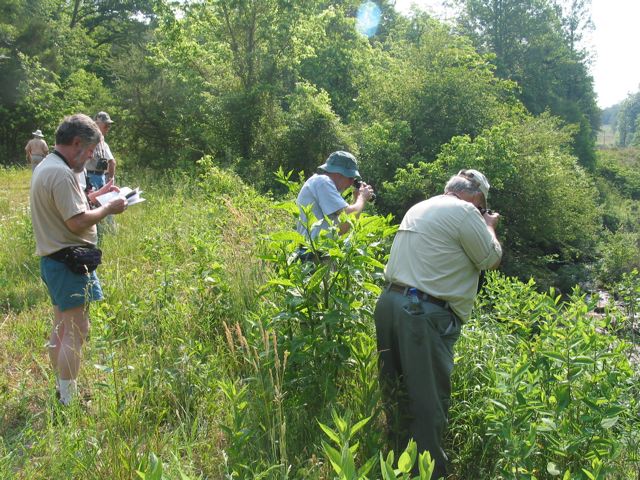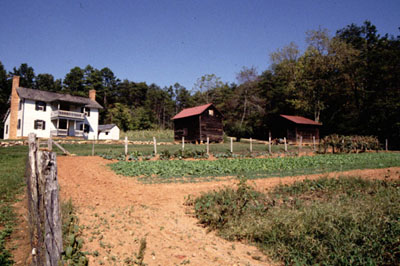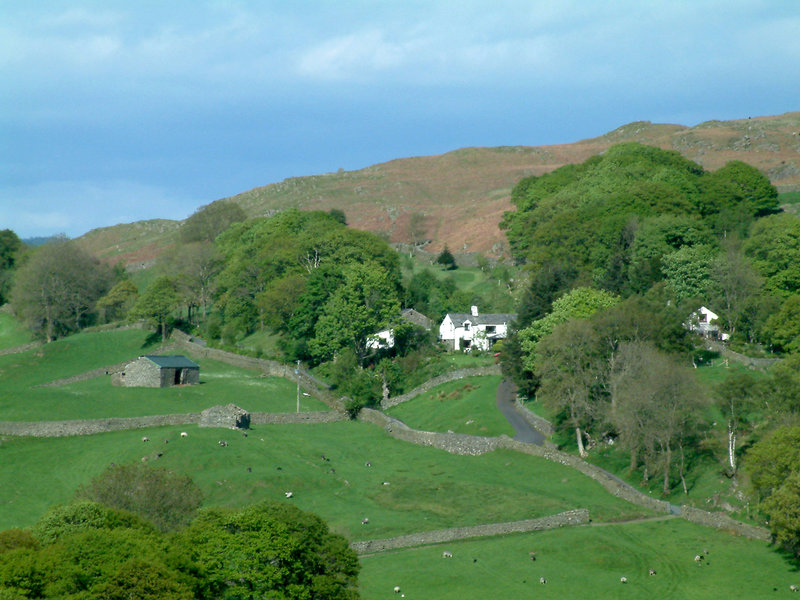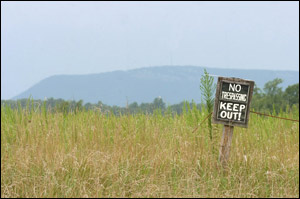
Butterfly hunting in Stokes, Carolina Butteryfly Society
I noticed in the reader statistics for this web site that someone recently found the web site with the search “sustainable living, Stokes County, N.C.” What a great idea for a post.
Sustainable living means frugality and low consumption, with minimum disturbance to land and wildlife.
First of all, Stokes County cannot sustain a sustainable living for too many people. Just as the woods can support only so many squirrels (in direct proportion to the nut supply), a rural setting can support only so many humans in a sustainable way. Stokes County does not need more commuters. Already, 71 percent of Stokes workers commute to other counties for their jobs. That’s not a trend that needs to be made worse. But for those few people like retirees who have an outside income, or for those lucky enough to make their living within the Stokes County economy, there are many reasons why Stokes County is a good place for a sustainable lifestyle.
Stokes’ population density — 99 people per square mile — is lower than the surrounding counties. According to the Census Bureau, for comparison, here are statistics for people per square mile: Forsyth 747, Surry 133, Rockingham 162, Yadkin 108, Henry County, Va., 152. You have to go to west to Ashe County, N.C., bordering on the Tennessee line, to get an impressively low population density — 57 people per square mile.
In Stokes, much of the population is concentrated in King and a couple of other small towns, so in rural areas the population density is considerably lower. From aerial photos, I estimate that fewer than 20 people live on the square mile around my land.
In 2003, Stokes County commissioned an economic survey by a research company, Angelou Economics. That survey contains some interesting information. Stokes County has 110,000 acres of farmland, or 38 percent of the county. From about 1995 to about 2000, Stokes actually lost some population as manufacturing jobs were lost. During this time, there was good growth in tourism. Stokes has a jobs-to-residents ratio of 1:5, way below the “desirable” ratio of 1:2. If you need a job, Stokes County is the wrong place to go.
Economic statistics aside, in my opinion one of the biggest factors favoring a sustainable lifestyle in Stokes is cultural. Many people in Stokes are farmers, and many of the longtime residents of Stokes still have the skills that their grandparents and great-grandparents needed to live close to the land. Many Stokes residents still have their farms, their crops, their outbuildings, and their tractors, and they know how to use them. People who live simply and close to the land get respect. Stokes County values its past and wants to preserve it.
Horne Creek Living Historical Farm is in Pinnacle, and I believe it may be across the Surry County line. But it’s all about how our forebears lived sustainably on the same land we live on today:

Horne Creek Living Historical Farm
Of course, no one is an island. Sustainable living is a community concern. Farmer’s markets, pick-your-own berry farms, and sharing of produce with neighbors are already strong in Stokes and surrounding counties, and getting stronger.
We all consume too much energy. Duke Energy’s low rates don’t encourage conservation, and Duke’s environmental record is not good. Linda Brinson has written in the Winston-Salem Journal about why Duke has such low rates. It’s from the coal dug gracelessly out of the mountains in West Virginia and hauled in by train to places like the Belews Creek Steam Station.
We all have different situations, so we each have to figure out the best way to manage our energy consumption. I’ll write more about my own plan for minimizing energy consumption in the future, but the fundamentals are:
— Drive less. Leave the car at home for days in a row. One’s home should be so interesting that one doesn’t need to go out for entertainment. Shopping trips need to be minimized.
— Live in a small, efficient house. My house will be 1200 square feet. I plan to splurge on a reflective metal roof and maximize insulation. I plan to have a whole-house attic fan that will pull in cool air from the woods and push hot air out through the attic, leaving the air conditioning off except during the hottest of weather. The building site also is well positioned. It’s on a south slope, with a large stand of hardwoods to the south. Thus the house will be shaded in summer but will get sunlight in winter.
The North Carolina Department of Agriculture and North Carolina State University Extension web sites are excellent sources of information on living well, and efficiently, with articles on everything from farmers markets to growing shitake mushrooms as a cash crop.
A partnership between people who remember, or want to revive, a simple and traditional lifestyle with people who’ve made it a science, like the Department of Agriculture and N.C. State, is a powerful partnership.
The N.C. State Extension has a presence in Stokes. Take note of their workshops and classes.
See also the Stokes Center of Regional Economics, which seems to take a particular interest in Stokes County’s most promising crop, sweet potatoes:

Stokes Center of Regional Economics












